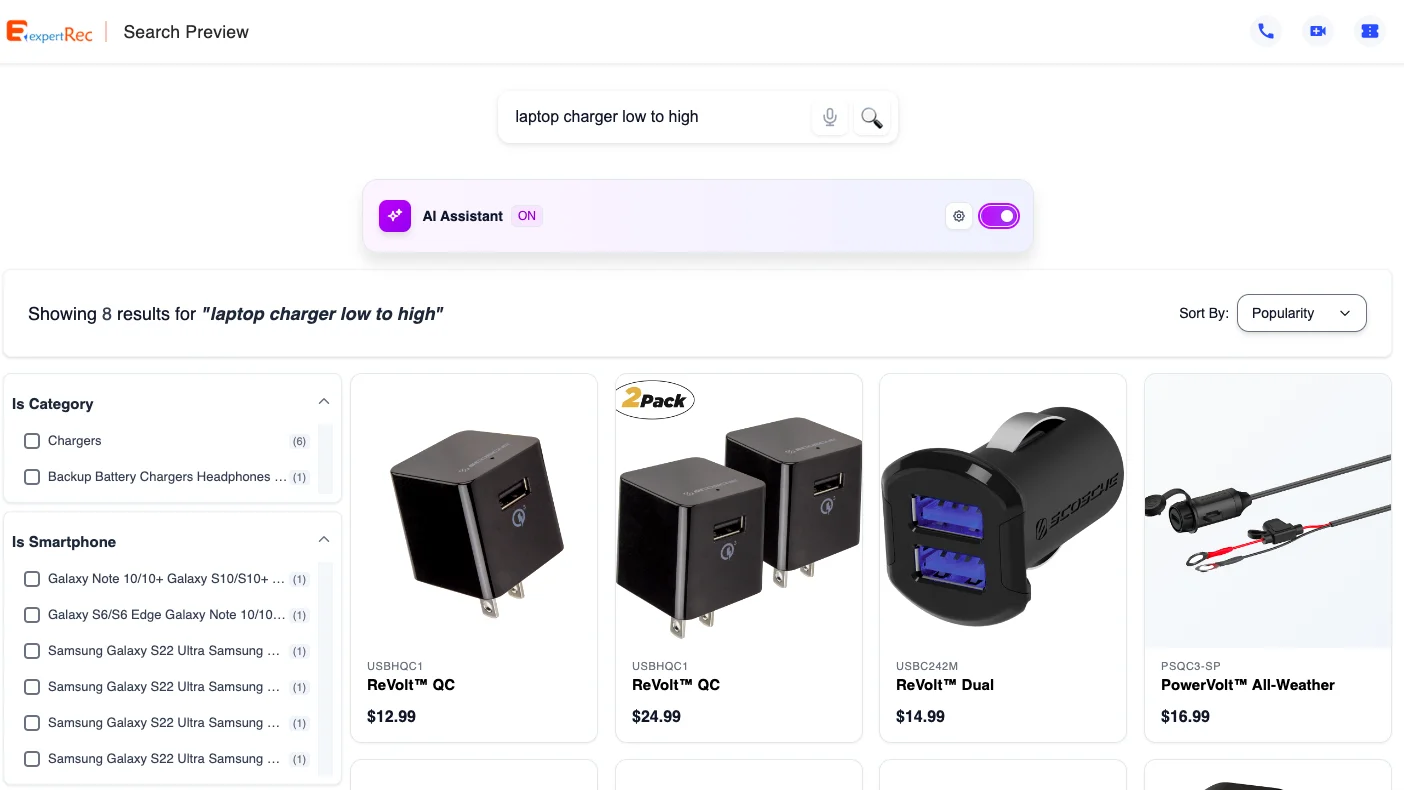In the competitive world of ecommerce, users expect to find what they’re looking for fast. However, traditional keyword-based search often fails to capture the nuances of user intent, especially in cases where queries are vague, multi-faceted, or exploratory. That’s where contextual search for ecommerce comes into play. It helps platforms interpret user intent by considering the context around the search past behavior, session data, product attributes, and more to deliver smarter, more personalized results.
As ecommerce businesses continue to scale, contextual search is becoming essential for increasing conversion rates, improving customer experience, and staying ahead in the market.

What Is Contextual Search?
Contextual search refers to a search system that goes beyond keyword matching. It understands the meaning, intent, and circumstances surrounding a user’s query by factoring in:
-
Past user behavior (clicks, purchases)
-
Current session data
-
Device and location
-
Time of day or season
-
Product metadata and content
-
Related user activity
Instead of treating each query in isolation, contextual search systems analyze signals to build a richer understanding of what the user is actually looking for. For example, if a user searches for “formal shirts” during a seasonal sale, the engine may prioritize discounted items in the user’s preferred size and brand, based on previous sessions.
How Does Contextual Search Work?
Contextual search relies on a mix of technologies that combine to interpret and respond to user intent more accurately:
1. User Behavior Analysis
AI systems track actions like views, clicks, cart additions, and purchases to understand preferences. For instance, if a user frequently buys eco-friendly products, the engine may highlight sustainable options higher in future search results.
2. Machine Learning Models
Machine learning algorithms analyze patterns across users and products to predict the most relevant items for each query. These models are trained to weigh contextual signals like device type, purchase history, and category affinity.
3. Natural Language Processing (NLP)
NLP is used to understand the structure and meaning of user queries. Contextual NLP engines can distinguish between polysemous terms (e.g., “Apple” as fruit vs. brand) based on previous queries or clicked results.
4. Vector Search and Semantic Matching
By converting text into vector representations, the search engine can find semantically related content even when queries are loosely phrased. This allows the engine to surface relevant products even if the exact keywords are missing.
5. Real-Time Context Updates
Modern contextual search engines update user context dynamically within sessions. A user who starts by browsing party dresses and later searches for heels will likely see results tailored to match the earlier product choices.
Why Ecommerce Needs Contextual Search
Traditional ecommerce search systems typically rely on keyword matching, filtering, and manual ranking. However, this static approach no longer meets the needs of today’s users, who expect:
-
Instant, personalized product discovery
-
Context-aware recommendations
-
Search that understands incomplete or vague queries
-
Dynamic experiences across mobile and desktop
Benefits of Contextual Search in Ecommerce:
-
Increased Conversions: Users are more likely to buy when shown relevant products faster.
-
Lower Bounce Rates: Contextually relevant results keep users engaged longer.
-
Improved User Satisfaction: Personalized and intelligent search creates a better shopping experience.
-
Cross-Sell & Upsell Opportunities: Search engines can suggest complementary items based on shopping behavior.
Is Contextual Search Worth Using?
Absolutely. With ecommerce competition intensifying and customer acquisition costs rising, improving product discovery becomes a key driver of growth. Here’s why contextual search is worth the investment:
1. Customer-Centric Experience
Contextual search adapts to user preferences and intent, creating a tailored experience. This builds loyalty and encourages repeat purchases.
2. Enhanced Mobile Usability
Mobile users often enter short, ambiguous queries. Contextual understanding fills in the gaps, improving usability on small screens.
3. Revenue Impact
By surfacing relevant products more effectively, contextual search contributes directly to sales and average order value.
4. Future-Readiness
AI-powered contextual search positions ecommerce platforms for integration with voice search, chatbots, and conversational interfaces, which are rapidly growing in popularity.
Are There Better Alternatives?
While contextual search is highly effective, it is part of a broader family of AI-driven search technologies. Let’s compare contextual search with other approaches:
| Search Type | Description | Pros | Cons |
|---|---|---|---|
| Keyword Search | Matches exact words in queries and product listings | Simple, fast, easy to implement | Lacks personalization or context |
| Faceted Search | Filters results by attributes (size, brand, etc.) | Improves navigability | Manual setup, doesn’t infer intent |
| Semantic Search | Matches meaning rather than exact words | Handles vague or natural language queries | May require significant ML training |
| Contextual Search | Uses context to interpret intent and personalize | Highly relevant results, dynamic | Requires data integration and ML pipeline |
While some ecommerce platforms still rely on keyword or faceted search, the best results come from combining contextual search with semantic and behavioral data, creating a hybrid system that adapts to each user’s journey.
How Expertrec Powers Contextual Search for Ecommerce
Expertrec offers a powerful, scalable search engine tailored for ecommerce brands that want to offer contextual, intelligent product discovery without the hassle of building complex AI systems in-house.
Key Features of Expertrec’s Contextual Search:
1. Real-Time User Context Handling
Expertrec dynamically captures session data, click behavior, device information, and more to adjust search results instantly.
2. Personalized Ranking Algorithms
Expertrec’s engine ranks products based on individual and collective behavior, increasing relevance and conversion rates.
3. Semantic and Vector Search Integration
Go beyond keywords with semantic understanding and vector-based similarity matching to return the most relevant items even when users are imprecise.
4. Customizable UI and No-Code Integration
Brands can deploy Expertrec’s search widgets with minimal coding. Custom UI options ensure the search bar fits the website’s look and feel.
5. Multi-Device Optimization
Expertrec delivers fast, context-aware results on both desktop and mobile, optimizing for screen size, interaction mode, and device history.
6. Built-in Analytics Dashboard
Get insights into user behavior, search performance, and product engagement to refine your offerings and boost ROI.
Final Verdict
Contextual search for ecommerce is no longer a “nice to have.” It’s becoming a must-have tool for online stores that want to deliver high-performing, personalized user experiences. In a market where every second counts and relevance drives revenue, contextual search ensures that your users find what they need, when they need it.
By implementing a solution like Expertrec, businesses can tap into the power of contextual understanding, semantic matching, and personalization all without building complex infrastructure from scratch. With fast setup, scalable architecture, and proven ROI benefits, Expertrec is the ideal partner for any ecommerce business ready to modernize its search experience.
FAQs
Contextual search uses user data, session behavior, and product metadata to deliver personalized and intent-driven search results in real time.
2. How is contextual search different from keyword search?
Unlike keyword search, contextual search interprets user intent based on past behavior, context, and semantics—providing smarter and more relevant results.
3. Can Expertrec integrate with Shopify, Magento, or WooCommerce?
Yes. Expertrec supports integration with major ecommerce platforms and can be implemented using scripts, plugins, or API.
4. Is contextual search suitable for small ecommerce sites?
Absolutely. Even small stores can benefit from increased engagement, better product discovery, and higher conversion rates.
5. Does contextual search improve SEO?
While primarily focused on on-site search, improved engagement and lower bounce rates can indirectly benefit SEO through better user signals.
6. How long does it take to implement Expertrec’s contextual search?
Most implementations take only a few days, thanks to Expertrec’s low-code/no-code approach and pre-built models.




